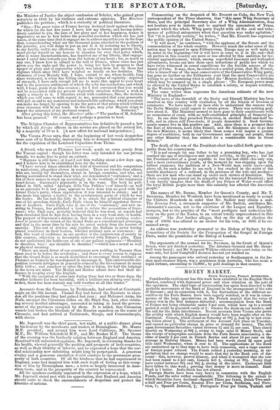Mr. Ingersoll was the chief guest, last night, at a
public dinner given In his honour by the merchants and traders of Birmingham. Mr. Muntz M.P. presided ; and around him were Lord Calthorpe, Mr. Spooner M.P., Mr. William Scholefield M.P., and Mr. Booker M.P. The theme of the evening was the brotherly relation between England and America. Receivedewith unbounded applause, Mr. Ingersoll, in returning thanks for his health, viewed generally the position and prospects of both countries, as well as their identity of interest, and he expressed a hope that the cor- dial relationship now subsisting might long be perpetuated. A generous rivalry and a generous emulation would conduce to the permanent pros- perity of both countries. Of all the kindness that he had experienced in England, none had inspired him with such depth of feeling as this recep- tion of him by Birmingham men ; a town so largely interested in Ame- rican trade, and in the prosperity of the country he represented.
All the speakers cordially concurred in the expression of a hope, which Mr. Ingersoll stated met with his approbation, that England and America should unite to check the encroachments of despotism and protect the liberties of nations.
Commenting on the despatch of Mr. Everett on Cuba the New York correspondent of the Times observes, that "this same Whig Secretary of State, and the principal Secretary also of a Whig Administration, does not hesitate now to indorse and to applaud the annexation of Texas, against which the whole Whig party fought with all the zeal and 'vehe- mence of political antagonists when that question was under agitation." Yet "it is perfectly certain," he writes, " that Mr. Everett has expressed the public opinion of the United States." "It will meet," he continues, "with the applause of the Senate and the commendation of the whole country. However much the sober sense of the nation may be opposed to open Filibusterism, Europe may as well make up its mind in the beginning—for it will have to come to it in the end—that all parties in this country are more or less affected by this ambition for ter- ritorial aggrandizement, which, among superficial reasoners and hotheaded adventurers, breaks out into those open infractions of public law which we have twice witnessed in armed expeditions for the forcible seizure of the island of Cuba. It may, then, be considered a settled point., that Mr. Everett, who is himself one of the most conservative of the Conservative-Whig party, has gone no further on the Filibustero road than the most Conservative are willing to go in sustaining what is called the Monroe doctrine,'—a doctrine which may be summed up in a single phrase : 'No European power must be allowed by the 'United States to establish a colony, or acquire territory, in the Western hemisphere." The same writer thus expresses the American estimate of the new Ministry in England— "The news of the downfall of the Derby and Disraeli Ministry has been received in this country with exultation by all the friends of freedom of commerce. We have none of us been able to understand the reasons why the Derby Ministry could expect to retain power. There was nothing posi- tive about it. The Ministers seemed to have gone to their constituents with no earnestness of creed, with no well-established principles of financialpo- licy. In one shire they preached Protection, in another Half-and-half ta- riffs, and in others still Free-trade, if people demanded it. Such Govern- ments cannot live in this positive age. And, since there is a prospect that the Earl of Aberdeen, Lord John Russell, and Mr. Gladstone are to go into the new Ministry, it seems likely that these names will inspire a greater degree of confidence' both in our Government and among our people, than any other Ministry that, has existed for a considerable time in Great Britain."
The death of the son of the President-elect has called forth great sym- pathy from his countrymen.
"It is sad enough for any father to lay a promising boy, who has just reached the age of intelligence and mental activity, in the grave ; but for the President-elect of a great republic to lose his last child—his only son, and a most extraordinary youth, at the moment he was stepping upon the loftiest eminence the ambition of a New-World man could crave—and, above all, for such a father to see such a boy crushed in the midst of the terrible machinery of a railroad, in the presence of the wife and mother— there are few men who can stand up under such strokes of desolation. The whole country has poured out its sympathy for the bereaved President; and I can hardly imagine that the death of any Prince of Wales would affect the loyal British people more than this calamity has affected the American people."
The names of Mr. Dunne, Member for Queen's County, and Mr. T. Devereux, Member for Wexford, have been mentioned as ready to accept the Chiltern Hundreds in order that Mr. Sadleir may obtain a seat. The _Evening Post, a strenuous supporter of Mr. Sadleir, attributes Mr. Alexander's success, not to the exertions of the League and 'Equality- mongers, but to the practice of the "most profligate and audacious bri- bery on the part of the Tories, to an extent totally unprecedented in this country." The Post further alleges, that on the day of election the sum of 10001. was offered to an elector for his vote, or 5001. if he re- mained away.
An address was yesterday presented to the Bishop of Sydney by the Committee of the Society for the Propagation of the Gospel in Foreign Parts, under the presidence of the Bishop of London.


































 Previous page
Previous page